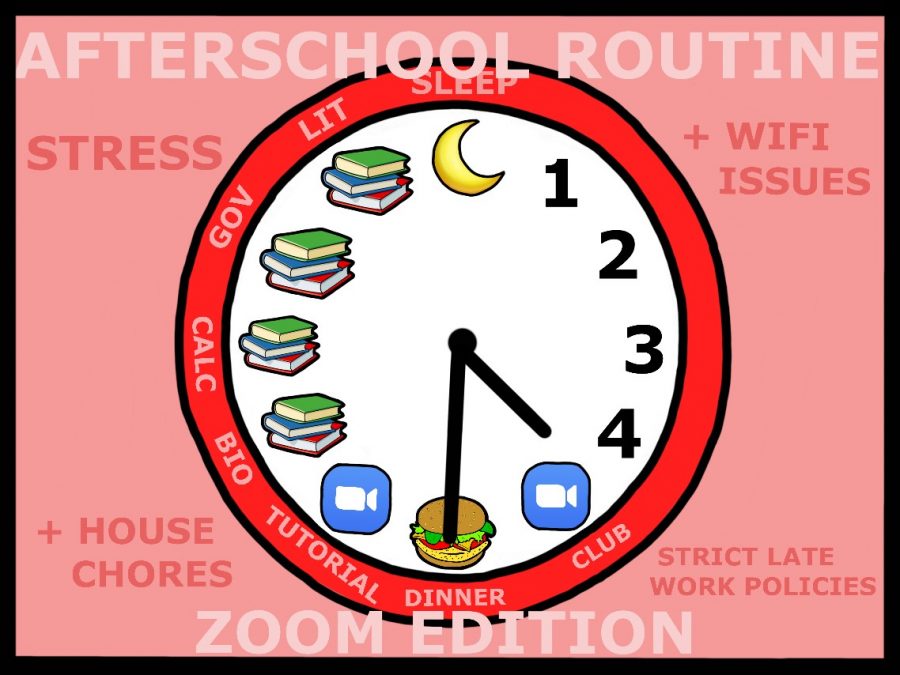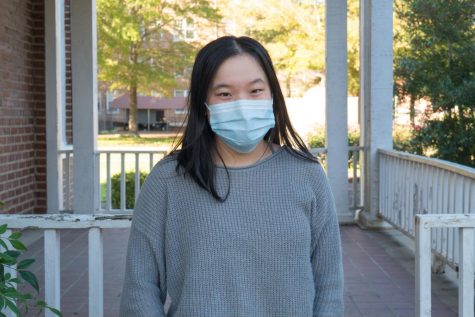Yan: Harsh penalties for late work in a pandemic are unjustified
Online schooling has led many students to feel overworked and overwhelmed by a busy schedule full of school work around the clock.
February 19, 2021
For most students, a typical morning routine would involve waking up to the sound of an alarm, changing into clothing and getting ready to head to school. However, when the pandemic hit the US around a year ago, our routines changed drastically. Once we saw the smiles of other students across the room; now we stare at each other through the screen. Virtual learning has turned our worlds upside down. More specifically, it has brought forth a new set of challenges for students.
In a virtual school environment, students often have trouble concentrating, face technical issues and struggle to remain in contact with friends. These challenges have flooded students with an overwhelming amount of stress along with an endless number of assignments to complete, causing them to have trouble keeping up with school work.
Because of the stress and anxiety caused by online school, it would only be reasonable to accept late work from students without such strict punishments given the circumstances, but that does not seem to be the case for schools across the country.
As the world faces an unprecedented situation, schools are not reducing the amount of homework given to students. In fact, many students often spend an average of three hours per day on homework. When they already spend around eight hours every day attending school from their devices, students are spending too much time looking at screens to simply complete “busy work.” Moreover, teachers are giving unneeded amounts of homework and assignments with late work penalties without realizing the stress students are facing outside of school, including clubs, jobs, family situations and college applications.
Furthermore, implementing too much homework with pressuring deadlines causes students to spend less time exploring their passions and degrades their overall health. One study done by Stanford researchers reports that excessive amounts of homework cause a significant increase in stress, sleep deprivation and minimal time to spend on family and interests. Especially in a pandemic, these effects are further accentuated as students are more likely to favor their GPA over their health. Schools should not force students to choose between their health and grades, especially with late work punishments. In reality, schools are feeding too much into the idea that getting assignments in on time trumps all other concerns such as mental health.
This struggle to complete work on time while also learning the information has especially taken a toll on underrepresented and underprivileged students. For example, 25% of black communities and 24% of low-income families with an income of less than $30,000 do not have reliable internet access to complete school assignments. These statistics show exactly why schools should not punish students, especially those who do not have the resources, for turning in late work as some do not have the same accessibility to resources as others.
Therefore, if teachers removed the penalties for late work, students’ stress levels will be greatly reduced, and they would not feel rushed to complete school work. After all, shouldn’t homework be assigned to allow students to fully comprehend a topic rather than have them rush to complete something that may not be their best work? The whole concept of having students complete homework before a due date defeats the purpose of actually assigning homework in the first place.
If schools are truly looking for the optimal solution for students to achieve success in class during a pandemic, they would not be putting students through difficult situations on top of late work consequences. Even if deadlines were originally put in place to make sure students stay on track, this line of reasoning does not work in a hybrid or virtual learning environment during a pandemic. Students are currently struggling to get through a single school day, and it is about time that schools and teachers realize that and ease down on the harsh penalties of late work.










